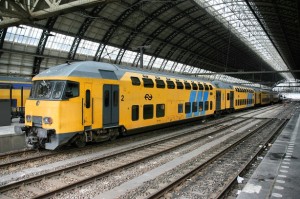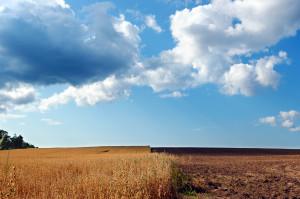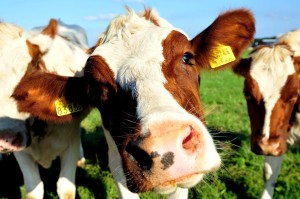Worldlog Tjedan 27 – 2014
Dva uspjeha prošlog tjedna!
Prvi je da članovi vlade ubuduće moraju putovati vlakom na poslovne sastanke koji su udaljeni do 750 km. To je dobar korak prema štedljivijem svijetu.

Članovi Donjeg doma često odlaze na poslovne sastanke i u druge zemlje. Dogovor je bio takav da se na internacionalne sastanke do 500 km moralo putovati vlakom. Primjerice, za posjet Berlinu se još uvijek standardno koristi (vladin) zrakoplov. Putuje se zrakoplovom, koji su veliki zagađivači, unatoč dobroj povezanosti sa susjednim zemaljama.
Drugo, prihvaćen je naš prijedlog o obustavljanju bankarskih poslova s Royal Bank of Scotlandom. Prošlog sam tjedna govorila o tome u Worldlogu. Royal Bank of Scotland zaslužila je ogroman nedovoljan po nizozemskom testu “Pošteni bankar”, prema kojemu se istražuju ljudska prava, dobrobit životinja i ekologija.

Banka Royal Bank of Scotland kućni je bankar Kraljevstva. Od 2008. godine ona prati sve transakcije Donjeg doma i ministarstava. Time banka godišnje zaradi 1.7 do 2.0 milijuna eura.Royal Bank of Scotland se zbog skandala vezanih za bonuse, ali i zbog Libro afere, često našla na meti medija. Pročitaj više o tome u prošlom Wordlogu.

Stremimo ka Europi bez gentecha! Dok se to ne ostvari, zemlje članice bi trebale imate slobodu odlučivanja da se na njihovoj zemlji zabrane genetički manipulirane biljke. Dogovor koji su postigli ministri okoliša zemalja članica je, prema našem mišljenju, nezadovoljavajući jer ne omogućuje realizaciju takve nacionalne zabrane.
Prošlog sam se tjedna žestoko založila za zabranu primjene elektrošokova i stalno vezanje krava u govedarstvu. Stalno vezivanje i primjena elektrošokova kako životinja ne bi obavljala nuždu na mjestu gdje leži, ne priliči kulturnom svijetu. Državna tajnica Dijksma je doprinijela debati tako što je obećala istražiti koliko poduzeća koriste elektrošokove.
U starim je štalama uobičajeno da se krave stalno vežu konopcem ili lancem. Takozvani „trener krava“ može se koristiti tako da mjesto za ležanje i zavezana krava ostanu čisti. Treneri krava su električne žice koje se vežu iznad kravljih leđa. Prilikom obavljanja nužde krave prime električni šok, tako da zakorače unatrag, te im mjesto za ležanje ostane čisto.
U veljači sam postavila nekoliko pitanja o vezanju krava. Zavezane krave ne mogu hodati i imaju malo prostora za kretanje. Zbog toga mogu nastati određeni zdravstveni problemi koji mogu opasno naškoditi kravi. Zaustavimo, dakle, ovu brutalnu praksu.
Ovo je divna kampanja koju treba podržati! Ova grupa skuplja novac za čišćenje oceana (osobito od plastike). Nakon samo 19 dana skupili su 750.000 dolara. Pomogni i ti očistiti oceane od plastike!
Za sve ljude koji tvrde da su veliki solarni parkovi zasad nemogući, Čile dokazuje suprotno. Može se! Čile će, naime, otvoriti najveći solarni park u Latinskoj Americi. 🙂
Pozdrav, Marianne
Two breakthroughs in the past week!
The first is that the Members of the Parliament will in future have to travel by train if they have work appointments that are no further than 750 kilometres away. This is a wonderful step towards a more sustainable world.

Members of the Lower House frequently make working visits, also to other countries. The agreement was that international working visits up to 500 kilometres away would have to be made by train. For instance, for visits to Berlin the (government) plane was thus standardly used. This is despite the fact that flying is environmentally contaminating and that there are good train connections with our neighbouring countries and the countries surrounding them.
Secondly, our motion was adopted to stop banking with Royal Bank of Scotland. I already spoke of this in last week’s Worldlog. Royal Bank of Scotland scores a poor grade in the test of the Dutch ‘Fair Bank Guide’, which investigates human rights, animal welfare and the environment.

Royal Bank of Scotland is the State’s principal banker and has been taking care of the payment traffic of the Lower House and of all ministries since 2008. With this, the bank earns 1.7 to 2.0 million euros on an annual basis. Because of scandals regarding bonuses and the Libor Affair, Royal Bank of Scotland received bad press. Read more about this in last week’s Worldlog.
Last week, the focus was also on genetic technology, as European regulations on the admission and cultivation of genetically manipulated crops will change in the short term. The consequence thereof will be that Member States are given the option to reject the cultivation of genetically modified crops within their territory. In return, however, more genetically modified crops will be permitted in Europe. Furthermore, there is a big chance that a company like Monsanto will bring charges to Member States which prohibit genetic cultivation within their territory.

We aim at a Europe without genetic technology! But until that is the case, Member States should have the option themselves to prohibit the cultivation of genetically modified crops within their territory. The agreement that was recently made between the Member States’ Ministers of the Environment is completely insufficient to effect such national prohibition as far as we are concerned.
The past week, I have also stood up for the banning of electric shocks and the permanent tying of cattle in cattle farms. The permanent tying of cattle and the use of electrical shocks to force the animal not to relieve itself in its resting area does not suit a civilised country. State Secretary Dijksma did promise in the debate that she would investigate how many companies use electrical shocks.

Cows are frequently permanently tied by a rope or chain in old stables. A so-called ‘cow trainer’ can be used to keep the resting area of the tied cow clean. Cow trainers are live wires that are hung above the back of the cow. When relieving themselves they will get an electric shock so that they take back a step and keep the resting area clean.
In February of this year, I already asked questions about the tying of cows. Cows that are chained cannot walk and have limited room to move. This can result in health problems and it seriously affects the welfare of the cows. They must stop these highly animal-unfriendly practices!
This is a great campaign to support! This action group collects money to clean up the oceans (make them free from plastics). After 19 days of campaigning, they have already collected an amount of 750,000 dollars. Please help to clean the oceans from plastic!
Chile has proved the contrary to all people who said that large solar power plants are not yet possible. It is possible! Chile is opening Latin America’s largest solar power plant. 🙂
Greetings, Marianne